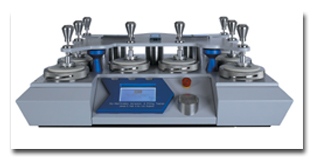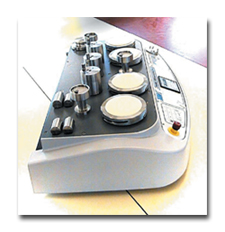J
ames H. Heal and Co. Ltd., England, has been in the textile business since 1872. For
roughly the last 50 years, the company has been totally dedicated to the supply of testing
instruments, quality consumables, and global maintenance and calibration services. During that
period, Heal has contributed to the science of testing by introducing many product and service
innovations.
Product Development
Every manufacturer knows a continuous stream of new and enhanced products is vital for its
future success. However, getting the product right the first time, within budget and to the agreed
time scale represents a massive challenge.
Over the years, Heal has perfected a method of product development that invariably produces what
it describes as outstanding results. Simultaneous involvement of every part of the business, as
well as agents, distributors and, most importantly, users, is fundamental to the company’s
approach.

James H. Heal introduced the Nu-Martindale 864 abrasion and pilling tester at ATME-1
2004.
Recent notable testing instrument successes include the Apollo for lightfastness and weathering,
Thermaplate for colorfastness and stability, TruBurst for bursting strength, SnagPod for snagging
and Heal’s own brand of Quality Assured Consumables.
Abrasion Testing
Heal has led the way in the important field of Martindale testing, which tests a fabric’s
ability to resist wear and pilling. The company initiated many firsts in the field of Martindale
testers. It was the first to:
- offer a six-station machine;
- include individual station counters;
- incorporate a hinged top plate;
- use quick-lock, clamping rings;
- achieve United Kingdom Accreditation Service (UKAS)-accredited calibration;
- introduce a single-station machine; and
- introduce higher speeds for accelerated testing.
Nu-Martindale 864 Abrasion And Pilling Tester
The ergonomically designed Nu-Martindale 864 abrasion and pilling tester, launched last year at
the American Textile Machinery Exhibition-International (ATME-I), is one example of the company’s
expert approach to product development.
Although it has been manufacturing and designing Martindale instruments since the early 1940s,
Heal still has been able to make substantial improvements to the efficiency and performance of its
latest machine.
The 864 is a four-, six-, or eight-station machine. The concept is simple: Buy a four-station
machine and upgrade at the time of purchase or later to a six- or eight- station machine. Upgrading
is easy – no tools are required and anyone can do it. The key issue on any eight-station machine is
the accessibility of the abrading tables. How easy is it to change the felt and the abrasive cloth?
After all, there’s little point in having eight stations if you can’t use them all comfortably,
according to the company.
Unrestricted access is achieved by clever positioning of the abrading tables, the radical shape
of the top plate and three primary parking positions for the top plate.

Heal offers an entry-model four-head Nu-Martindale pilling tester suitable for use in small
test laboratories.
The plate can be parked at the rear, on the right or on the left, leaving the tables fully
exposed. The top plate does not need to be lifted to access any of the eight tables.
The 864 offers versatile, easy-to-use software. It also features different operating modes, an
averaging feature and the possibility of grouping stations to create two machines in one. There
also is a facility for altering the test speed. The machine can be set to run at half the normal or
1.5 times the normal speed.
As abrasion testing is a slow process, this unique feature opens up possibilities for developing
new test methods or for accelerating tests.
Value For Money
Behind the scenes, Heal invests in state-of-the-art production machinery, which substantially
improves the company’s ability to reduce manufacturing costs. These investments have significantly
impacted the pricing of the new 864, making the machine extremely price-competitive, according to
Heal.
Quality Assured Consumables
The 864 is a machine of high quality. Good results are nevertheless dependent on the quality and
reliability of the consumables required for the testing process. Heal recommends its brand of
Quality Assured Consumables. Abrasive cloth, felt and foam are now available as pre-cut discs for
maximum convenience and minimum waste.
April 2005




